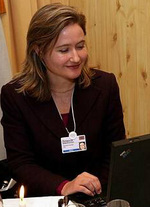Rebecca MacKinnon | |
|---|---|
 MacKinnon in 2021 | |
| Born | September 16, 1969 Berkeley, California, U.S. |
| Education | Harvard University (BA) |
| Occupation(s) | Journalist, author, researcher |
| Awards | Goldsmith Book Prize |
Rebecca MacKinnon (born September 16, 1969) is an American author, researcher, and Internet freedom advocate, and the co-founder of the citizen media network Global Voices. She is notable as a former CNN journalist who headed the CNN bureaus in Beijing and later in Tokyo. She is on the board of directors of the Committee to Protect Journalists, [1] a founding board member of the Global Network Initiative [2] the founding director of the Ranking Digital Rights project at the New America Foundation's Open Technology Institute, and is the Vice President for Global Advocacy at the Wikimedia Foundation.


